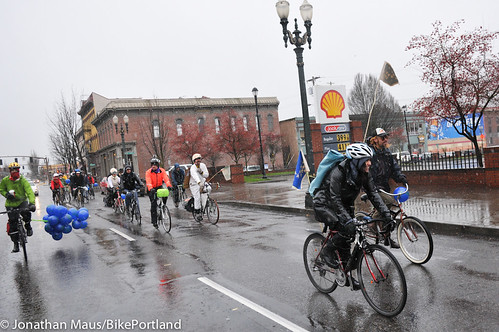Oregon keeps inching toward its goal of replacing or supplementing the gas tax it invented, back in 1919, with a Prius-proof mileage tax.
Next July 1, the first 5,000 volunteer drivers will get a chance to opt out of gas tax and into a so-called “usage charge.” As the state gets ready for that test, a meeting in Portland this Monday will be the last stop on a statewide tour to gather input about the concept.
It’s theoretically possible that a per-mile tax could eventually be made to vary based on location, creating an anti-congestion tool similar to the ones that have been effective in London, Singapore and San Diego. It’s also possible that the fees could vary by vehicle weight, which could preserve the gas tax’s energy efficiency incentives.
Oregon’s “2014 statewide listening tour” and the pilot project it’ll lead to are the results of a state law passed in 2013 that created the country’s first road usage charge program on a trial, opt-in basis.
Here’s the official summary of how the pilot program will work:
Oregon’s new road usage charge system will automatically collect mileage data from vehicles. Motorists will choose a mileage reporting device to interface with their vehicle and be paired with software to send mileage totals to a private account manager. ODOT will contract with private companies to maintain customer accounts, calculate charges and credits, and submit charges to the Oregon Treasury.
Advertisement
The basic reason for the experiment:
Funding for transportation system maintenance and construction has been declining in Oregon and around the country since the 1990s. This is due in part to more fuel efficient vehicles purchasing less gas, thus paying less in gas taxes – which go toward maintaining and building roads and highways.
Another factor here is essentially the same as the one behind Portland’s effort to create a new income tax for transportation: Americans are driving less, Oregonians most rapidly. Our drop in miles driven per person began in 1999, one of the earliest states to see this trend, and by 2011 it was down 18.7 percent, the biggest decline in the country. (That’s due both to our unusually car-lite cities and our unusually struggling rural areas.)
Even if vehicle efficiency weren’t rising, Oregon’s highway expansion schedule is premised on traffic volumes rebounding, and its road maintenance requirements depend on people continuing to pay into the system.
Next week’s meeting is Monday, Oct. 27, at Portland’s World Trade Center, 121 SW Salmon St. downtown, from 9 a.m. to noon. The state is inviting “business leaders, elected officials, city/county public officials, transportation representatives, media and other stakeholders” to attend.



